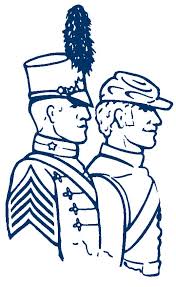Experience of POW Lt. Richard H. Kellahan
By Richard H. Kellahan, Class of 1944
Posted here with the permission of the Kellahan family. Originally written for the Oflag 64 Association (website).
Our entire class of 1944 left the Citadel at the end of our junior year in 1943. Infantry cadets went to Ft. McClellan, Alabama, for 17 weeks of basic training with other ROTC students from various schools. Upon completion of basic training we returned briefly to the Citadel for the Advanced Student Training Program while awaiting the beginning of a new class at Officer Candidate School where we would be commissioned as 2nd Lieutenants upon completion of the 17-week course. We graduated from OCS in May of 1944 and joined the 84th Infantry Division at Camp Claiborne, Louisiana, for the final stage of training before we were shipped to England and Europe for the final push into Germany.
 Richard H. Kellahan, Class of 1944
Richard H. Kellahan, Class of 1944
Cadet Platoon Sergeant, “C” Company
1943 Sphinx
We arrived in Germany in October 1944. The Allies were bogged down at that time in the mud and bad weather of late October and early November at the Siegfried Line, Germany’s heavily armed line of defense that was about 5 miles deep and ran from the Baltic Sea to the Alps. It was filled with pillboxes, anti-tank equipment, and every other kind of defense imaginable. Any advance by our troops was measured in yards.
My Citadel classmate Creswell Garlington and I led two platoons from [“I” Company] 3rd Battalion of the 335th Regiment on the morning of November 29, 1944, for a daylight attack on a small village called Lindern. We tried to lead our troops one mile in pitch black darkness, pass through the existing front line and hit the village at daybreak with the element of surprise as the key to our success. Out timing was slightly late because visibility was good enough so that we could see the enemy and they could see us. Lt. Garlington led the platoon ahead of mine, and his timing was a bit better. His platoon aroused the enemy so that we were met with blistering fire from small arms and three tanks camouflaged as haystacks. Our left flank was exposed in an open sugar beet field. Our platoon suffered heavy casualties and was pinned down by heavy machine gunfire. I desperately called for our artillery to fire on the enemy in front of us but to no avail. My 536 walkie-talkie was not working, and I could not make contact with Lt. Garlington or Battalion Headquarters or anybody. (After the war I learned that the Battalion’s radio antennae had been shot off and never worked at all.) We fought until about 20:00 when our ammunition was exhausted and the enemy overran us. The Germans captured us November 29, 1944.
See also: The class where 34 seats remained empty
From the day until Christmas Eve, we traveled by various means to O’Flag 64 at Szubin, Poland. This POW camp housed about 1200 ground force officers from the time of the North African Campaign on, including General George Patton’s son-in-law Col. Jake Waters. From Christmas Day until January 21, 1945, we rested and even grew bored. But the Russians broke through German forces from Warsaw, Poland, and we could hear their gunfire. The guards made us carry our own provisions from left-over Red Cross parcels and marched us north toward the Baltic Sea. This forced march was the most challenging and horrible part of our POW experience because the temperature went down to -20 degrees in blizzard conditions, preventing any escape. By the third night the Russians were so close that our guards abandoned us, but the returned the next morning. We walked an average of 15-20 kilometers per day through the snow, spending night in empty hay barns or churches with little or no food. What we had, we had scrounged from cellars.
After walking 175 kilometers, my CO and I pretended to be sick and joined 40 other POW’s in a boxcar. We traveled in this closed boxcar for a week without food or water in terribly unsanitary conditions. Finally we arrived in Lucenwald, a POW camp outside Potsdam. They gave us one meal, usually soup and a piece of bread, each day in ordinary POW barracks. From the yard we observed the bombing of Berlin by the Allies. The Russians came up from Dresden on April 21, 1945. The knocked down the wire enclosure but left us with no food. We scrounged around for food but did not venture far from camp because fighting continued all around us.
See also: An Unhappy Meeting Place for Four Alumni
One day someone told us that a number of trucks were stopped in a nearby field. About 25 of us went to the field and boarded the trucks. After an argument between a Russian officer and the American driver, they agreed that only those with American uniforms would ride in his truck. I quickly discarded my Yugoslavian overcoat to stay on board. The truck took us to an airbase near Wittenberg. We traveled by plane and train to the coast of France where people were cheering in the streets on May 7, 1945, because the war had ended. VE Day was celebrated on May 8, 1945, but the war actually ended on the 7th.
While we waited to be shipped back home, trucks with pitifully emaciated enlisted men came to the camp. We realized that their experiences in the POW work camps must have been much more terrible than ours had been. And of course, since our return to the States, we have learned how much longer and more severely others had suffered for our country. I simply offer this story as another POW story.
/RK
About the Author
Richard “Dick” Herman Kellahan (April 6, 1923 – January 12, 2014) grew up in Kingstree, South Carolina, graduated from Kingstree High School and attended The Citadel until his entire class was sent into military training at the end of their junior year. He served in the 84th Infantry Division in the Army in the European Theater until his capture the day after Thanksgiving 1944. After the war he returned to Kingstree and was years later awarded a Citadel diploma along with the other surviving members of the Class of 1944, “the class that never was.” Leaving a tremendous legacy, his three sons and three grandsons are graduates of The Citadel.
Dick worked as a farmer and a merchant until he began his career at the Williamsburg First National Bank in 1961. During his tenure at the bank, he served as Director, President, and Chairman of the Board until his retirement in 1995, though he continued to serve as board chairman emeritus. He also served as a director at the Kingstree Federal Savings and Loan, Williamsburg Regional Hospital, Williamsburg Academy, and Darlington Land Bank. Mr. Kellahan also joined the Kingstree Kiwanis Club and the Masonic Lodge. In addition, he served as a deacon and elder at the Williamsburg Presbyterian Church, and then became a charter member of the Kingstree Presbyterian Church where he also served as elder and elder emeritus.


Well that doesn’t surprise me that the Greatest Generation entire class of 1944 would leave the Citadel to join the the fight for the Alter Of Freedom, Bless them All.